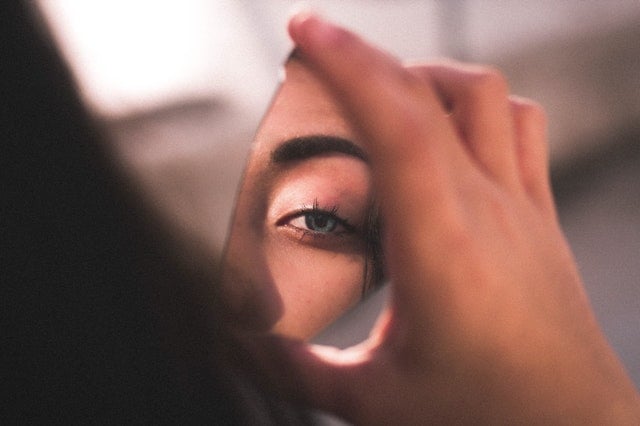*Editor’s note: some well-deserved strong language ahead!
~
“Whatever is deeply, essentially female—the life in a woman’s expression, the feel of her flesh, the shape of her breasts, the transformations after childbirth of her skin—is being reclassified as ugly, and ugliness as disease.” ~ Naomi Wolf, The Beauty Myth
~
There is a moment, a while ago, where I am in a fitting room blinking away tears.
Nothing fits properly, or feels good, or looks right. It is a moment where I hate on my body, seethe at its non-compliance. Loathe its inadequacy. Rage at its inferiority.
There is not a #bodypositivity quote that can save me in that moment; in fact, all the body positivity quotes in the world can die and go to Instagram hell as far as I’m concerned.
It throws me, this moment. After years of grappling with body image, deconstructing body image, writing, and speaking about body image, this feels like falling off the feminine wagon—a bender of self-hate I am powerless to control. I don’t understand at the time; I’m only aware of some kind of almost leverage over me, something I cannot define in that moment but feel held in its clutch nonetheless.
It is weeks later when I read an article in which Dr. Gail Dines, anti-porn activist and speaker, writes:
“Women are told in our society they have two choices. They are either fuckable or invisible.”
There is a resonance in this for me, a reconciliation to how I felt that day in the fitting room; indeed, how I have felt more often than not lately. That I am—as I enter into my 40s—no longer what society would deem as fuckable. That I am no longer seen. That I am no longer enough.
There before me was the biggest cultural lie I had fallen victim to, and with it, my biggest fear uncovered: the fear of becoming older, and therefore becoming invisible.
In that moment, I recognised the ways I have clawed and grasped at the last of my 30s, fraught with the idea that if I am not young, thin, fit, and beautiful then I am invisible. That my power as a woman does not lie in my capacity to reshape the culture and institutions upon which these very oppressions are formed, but on being, in a word, hot.
In her article, Dines goes on to say, “To be fuckable means to conform to the porn culture, to look hot, to be submissive and do what the man wants. That’s the only way you get visibility. And you cannot ask adolescent girls, who are dying for visibility, to choose invisibility.”
We understand and accept the pressure young girls are under to live up to the standards of a hyper-sexualised, image-based culture obsessed with being thin and sexy. Yet less is said about the way this pressure pervades women in their 30s, or 40s, and beyond. How, in our society, a woman’s value is tied to her youth, beauty, and sexuality. How we fear what happens to our identity when we are considered no longer young, beautiful, and fuckable.
And yet, I believe this fear goes deeper than aesthetics or vanity. It isn’t even about being fuckable, or not. It’s about fearing irrelevancy as much as invisibility. It’s about fearing the loss of approval, acceptance, and being in control of our own lives. It’s about fearing our ageing will lead to powerlessness, and the frantic grasping at our youth, beauty, and sexuality that we may somehow sidestep getting older, and therefore remain visible and relevant.
One of the most powerful and innate human needs at the core of each of us is this: the need to be seen. And, in a society groomed to believe our worth lies solely in our capacity to satiate the male gaze through sexual appeal, we conform to this lie of contemporary, idealised femininity in order to be seen. It comes back to scarcity—the deep-seated belief there is not enough room for all of us, so we are left with no choice but to hustle for our worth, thrown into the lion’s den of comparison and competition.
The one seen to be the most fuckable is the one most seen. The most fuckable wins.
We realise by conforming to these patriarchal ideals of feminine beauty we only serve to uphold a system we oppose, so we fight against it other ways. We flaunt our oversized, imperfect bodies on Instagram; flip the bird at #fitspiration pages, and reprogram society with images of beauty that don’t conform to these patriarchal ideals. But one scroll through the pages of half-naked, plus-sized, body-positive influencers exhibiting their array of porn chic gestures tells us the goal is still the same: No, I don’t have to be thin. But look. I’m still hot. I’m still sexy.
I’m still fuckable.
The underlying hustle is still there. The desperate need to be seen is still there. The belief that our sexuality is our most powerful and valuable asset is still there; a lie we must continue to challenge and dissolve—both in ourselves and in our wider culture—if we are to break these strongholds and overturn the patriarchal ideologies of ageing and beauty we have become enslaved to.
The danger doesn’t lie in being young or fit or thin or beautiful, but in believing we are worthless if we are none of these things. Our power, our worth, and our beauty exist not in how we look—indeed, we are never less powerful than when we are controlled by the need for acceptance or approval of others—but within the thoughts, feelings, and belief systems we hold true of ourselves.
We get to decide our own value: to redefine the standards of feminine beauty, to fall in love with ourselves at every age, to live with purpose and joy and meaning. To not waste our lives striving to be fuckable but, instead, unforgettable.
~











Read 38 comments and reply